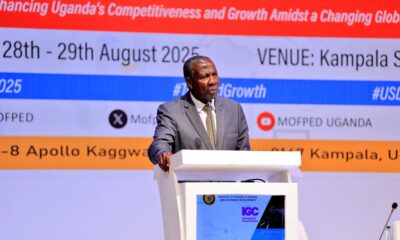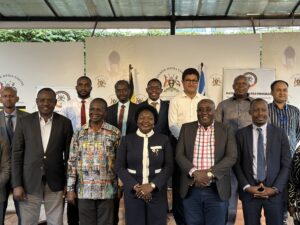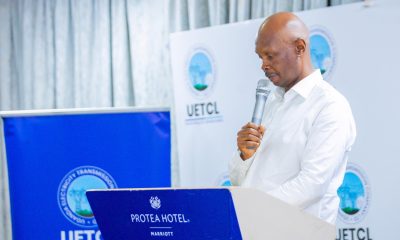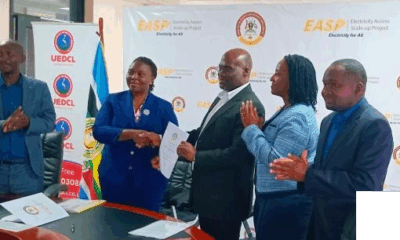Energy
Government Launches National Biofuels Blending Programme, Eyes Energy Security and Economic Growth
Uganda has officially launched its National Biofuels Blending Programme, marking a significant step towards strengthening energy security, promoting environmental sustainability, and boosting economic development. The announcement was made today by Hon. Dr. Canon Ruth Nankabirwa Ssentamu, the Minister for Energy and Mineral Development, during a media briefing at the Uganda Media Centre.
The initiative will initially involve blending Petroleum Motor Spirit (PMS), commonly known as petrol, with 5% fuel-grade ethanol (E5). This phased approach is set to gradually increase to a target of 20% blending as set by the Biofuels Act 2020
Minister Nankabirwa emphasised that this program is more than just a new fuel type; it embodies the President’s vision for a sustainable, integrated, and self-reliant economy. It is underpinned by robust legal and policy frameworks, including Vision 2040, the National Energy Policy 2023, the Biofuels Act 2020, and the Biofuels (Licensing) Regulations 2022.
The program aims to achieve several key objectives:
Enhance Energy Security: By reducing reliance on imported fossil fuels, Uganda aims to strengthen its energy independence and mitigate global price volatility and supply disruptions
Promote Environmental Stewardship: Biofuels, especially ethanol from renewable sources, offer a cleaner alternative that significantly reduces greenhouse gas emissions and improves air quality, supporting national climate action goals
Drive Economic Development: The program is expected to stabilize markets for local farmers, promote value addition to crops like maize, cassava, and sugarcane, and create jobs across the entire value chain from farming to processing, logistics, and blending. It will also promote secondary industries such as animal feeds.
Boost Investment and Innovation: The Ministry is actively creating opportunities for investment, with several partners already expressing interest in the biofuels industry
Export Potential: Given Uganda’s agricultural potential, the biofuels sector is anticipated to supply regional and international markets. Notably, there are opportunities to blend aviation fuel for markets like the EU, where regulations already require a 2% ethanol blend as of 2025, projected to rise to 70% by 2050.
The Ministry has made substantial progress in preparing for the program’s rollout. The launch will be followed by a six-month incubation period, not exceeding December 31, 2025, during which the industry is expected to achieve full operational readiness, and stakeholder sensitisation will continue.
Uganda is committed to sourcing locally produced ethanol, aligning with the “Buy Uganda, Build Uganda” initiative. The Ministry has already licensed producers with a combined annual ethanol capacity of 78.5 million liters, including Pro Industries, Kakira Sugar Ltd, G.M. Sugar Ltd, Hoima Sugar Ltd, and Bukona Agro-Processors. An additional 110 million litres of capacity is expected in the coming years.
Four strategic blending facilities have been licensed at key border entry points to ensure a steady supply of blended fuel;
- Modern Energy Ltd (Busia Border Point): Handling 49 million litres of PMS per month, operational by mid-July 2025.
- Bukona Agro Processors Ltd (Malaba Border Point): Handling an estimated 48 million litres, operational by the end of July 2025.
- Afro-Kai Ltd (Mutukula Border Point): Handling 6-8 million litres, operational by ethe nd of August 2025.
- Lake Victoria Logistics (Kawuku, Entebbe): Handling 10 million litres per month
Collectively, these facilities will process approximately 110 million litres of Petroleum Motor Spirit (PMS) annually, all of which is expected to be blended with 5% ethanol by volume.
Minister Nankabirwa assured the public of a fair pricing policy, stating that blending is expected to help reduce overall fuel costs, aligning with government efforts to lower energy prices. The government has also exempted denatured ethanol from taxes, making it more affordable for Ugandans for both blending and cooking. In collaboration with UNBS, national standards for blended fuels and ethanol have been finalised, and combined with measures like fuel marking, efforts will continue to ensure traceability and prevent adulteration
The success of this program hinges on the collective efforts of all stakeholders. Oil Marketing Companies are urged to accelerate their readiness during the incubation period, and all Ugandans are encouraged to embrace this cleaner, locally sourced energy alternative, which is also expected to improve combustion efficiency and engine performance for automobiles
The formal launch of the fuel blending program is planned for August 2025. The Minister extended appreciation to the media, the Ministry’s technical team, and the National Biofuels Committee (NBC) for their dedication in reaching this milestone
Comments




























